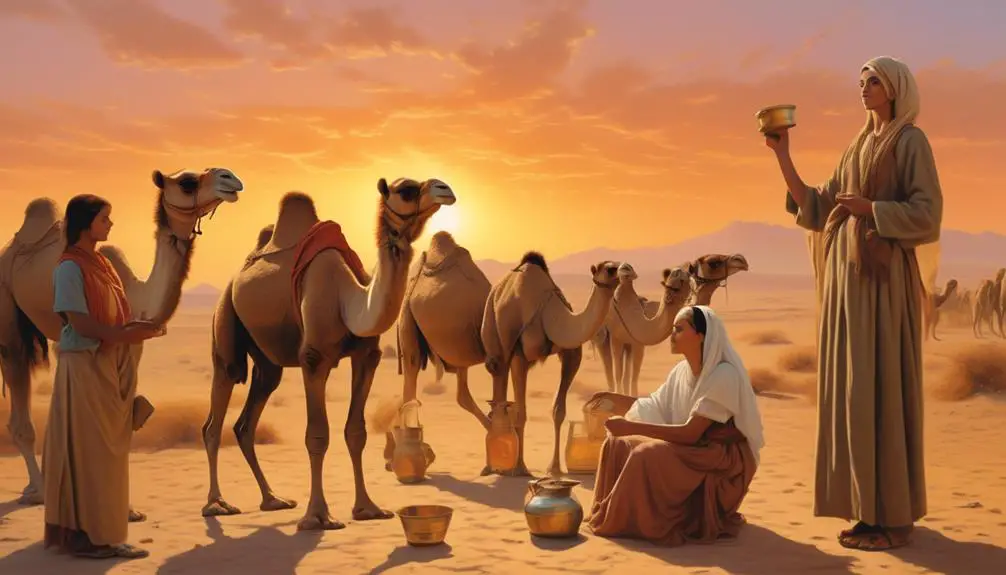Dive into Rebekah's intriguing biblical story and unearth timeless lessons about faith, courage, and resilience in our Bible study.

Bible Study – Learning About Rebekah
Like a well-drawn map, the story of Rebekah in the Bible can guide you through life’s winding paths. As you walk in her sandals, you’ll encounter a woman of remarkable faith, courage, and resilience.
Her journey, veiled in the mystic embroidery of the Old Testament, is one filled with marital bliss, familial strife, and divine encounters. You’ll find her life layered with complexities that resonate even in our modern world.
So, why not embark on this journey, peeling back the layers of Rebekah’s existence to uncover the timeless lessons her story offers?
Key Takeaways
- Rebekah’s strong sense of identity and purpose, rooted in her ancestral significance, played a significant role in shaping her character and decisions.
- The foundation of Rebekah and Isaac’s marriage was their shared faith and mutual commitment, which grew over time.
- The contrasting personalities of Rebekah’s twins, Jacob and Esau, led to a lifelong rivalry and highlighted the complexities of parental favoritism.
- Rebekah’s manipulative tactics and deception in orchestrating Jacob’s blessing serve as a cautionary tale about the consequences of unethical actions, even when driven by a perceived divine mandate.
Understanding Rebekah’s Background

Rebekah’s background is instrumental in shaping her character, and understanding it requires delving into her early life, familial ties, and cultural milieu.
You’re invited to consider Rebekah’s parentage and sibling dynamics as crucial components of her life story, distinctively influencing her personal development.
Rebekah, a prominent figure in biblical narratives, hails from a lineage of power and prophecy. She’s the daughter of Bethuel, a direct descendant of Abraham’s brother, Nahor. This familial connection isn’t mere trivia, but rather a foundation stone that supports her character’s structure. Her parentage, steeped in ancestral significance, provides her with a strong sense of identity and purpose, shaping her into a woman of influence in her own right.
Let’s shift our focus to her sibling dynamics. Rebekah is the sister of Laban, a relationship that plays a remarkable role in her life trajectory. Laban, a cunning and self-serving character, presents a stark contrast to Rebekah’s more compassionate and faithful nature. This dynamic, you’ll find, serves to highlight her virtuous character, often positioning her as the moral compass in her dealings with her brother.
In analyzing Rebekah’s background, it becomes clear that her parentage and sibling dynamics have indelibly shaped her character. They’ve given her a unique blend of strength and empathy, enabling her to navigate the complexities of her life with resilience and grace.
These familial elements don’t just provide context, they’re woven into the very fabric of Rebekah’s persona. Therefore, to truly understand Rebekah, you must acknowledge the profound impact of her familial roots and relationships.
Rebekah’s Marriage to Isaac

Building on the foundational understanding of her familial roots and relationships, let’s now examine the pivotal moment in Rebekah’s life – her marriage to Isaac – which further illuminates her character’s depth and complexity.
Isaac’s love for Rebekah wasn’t immediate, but rather blossomed over time, a testament to the patience and understanding that marked their relationship. Rebekah’s devotion to him was unwavering, evident not only in her initial acceptance of the marriage proposal but also throughout their life together.
Isaac was forty years old when he married Rebekah, a woman chosen for him by his father Abraham’s faithful servant. The choice wasn’t random, but divinely orchestrated. Rebekah was revealed through prayer and providence as the woman meant for Isaac. Her willingness to leave her home and family to marry a man she’d never met demonstrated a faith and courage that define her character.
Isaac’s love for Rebekah grew steadily, nurtured by her dedication and integrity. The Bible explicitly states in Genesis 24:67, ‘Isaac brought her into the tent of his mother Sarah, and he married Rebekah. So she became his wife, and he loved her.’ The phrase ‘and he loved her’ is noteworthy. It signifies not only the presence of romantic love but also a deep respect and affection founded on shared faith and mutual commitment.
Rebekah’s devotion, on the other hand, was expressed in her willingness to support Isaac, even when it required great personal sacrifice. Her dedication was unwavering, regardless of the circumstances. This commitment provides us an insight into the depth of Rebekah’s character and the strength of their marriage bond.
The Birth and Lives of Rebekah’s Twins

Delving deeper into Rebekah’s narrative, we encounter one of her most defining experiences – the birth of her twin sons, Jacob and Esau, which underscores her strength, resilience, and the profound influence she exerted on their lives. This episode not only highlights twin rivalry but also reveals a complex case of maternal favoritism that pervades their story.
Rebekah’s twins, Jacob and Esau, were polar opposites, and this stark contrast sparked a lifelong rivalry. Esau, the elder of the two, was a skillful hunter – rugged and outdoorsy, while Jacob was quiet, preferring to stay at home. You can’t miss the metaphorical representation of the dichotomy between civilization and wilderness, the pastoral versus the primitive, in their characterizations.
The twin rivalry goes beyond their personalities and seeps into their parents’ affections. In a clear demonstration of maternal favoritism, Rebekah preferred Jacob, the homely son. She wasn’t a passive observer in their lives but an active participant. She directed Jacob in deceiving Isaac, his blind father, to obtain the blessing meant for Esau, the firstborn. This event marks a pivotal point in their lives, shaping their destinies and the future of their descendants.
Rebekah’s story isn’t a simple tale of motherhood. It’s filled with complex themes of parental partiality, deception, and the struggle for supremacy. It’s a narrative that invites you to examine the intricacies of family dynamics, the influences of parental favoritism, and the profound impact such favoritism can have on sibling relationships.
Rebekah’s Role in Jacob’s Blessing

Navigating the labyrinth of family dynamics and favoritism, we find ourselves at the crux of the narrative – the pivotal moment when Rebekah orchestrates the deception that would secure Isaac’s blessing for her favored son, Jacob. This act reveals the extent of Rebekah’s motherly influence and her willingness to use deceptive tactics to fulfill what she believed to be God’s plan.
Rebekah’s role is critical to the unfolding of this story. She overhears Isaac’s intention to bless Esau, his firstborn, and she contrives a plan to ensure that Jacob receives this blessing instead. Rebekah’s actions serve as a catalyst for the subsequent chain of events. Her deceptive tactics involve disguising Jacob to appear as Esau, exhibiting a calculated and manipulative side of her character.
This episode illustrates Rebekah’s motherly influence as she persuades Jacob to partake in the deception. Despite Jacob’s initial hesitation, Rebekah asserts her maternal authority and convinces him to follow her plan. Her actions demonstrate the profound impact of her influence on the shaping of biblical history.
However, Rebekah’s actions aren’t without consequence. Her ploy deepens the rift between her sons and ultimately results in Jacob’s exile. It’s a sobering reminder of the potential fallout from manipulative tactics, even when they’re driven by a perceived divine mandate.
Lessons From Rebekah’s Life

Drawing lessons from Rebekah’s life, it’s clear that her decisions and actions offer a complex portrait of maternal love, faith, manipulation, and the consequences of deceit. You can see Rebekah’s generosity when she offered water to Abraham’s servant and his camels, a task that embodies selflessness and hospitality. This act of kindness demonstrated her heart’s capacity to give and serve others, providing a timeless lesson on the importance of generosity in our lives.
However, Rebekah’s tale isn’t just about virtuous deeds. Her deceptive strategies also play a significant role in her narrative. She manipulated her husband, Isaac, and son, Jacob, to ensure that the birthright and blessing that traditionally belonged to the firstborn son, Esau, would instead go to Jacob. This act of deceit eventually led to family discord and separation, reminding us of the negative consequences that our actions can have on our relationships.
Yet, even in her deception, Rebekah’s faith in God’s prophecy was evident. She believed in God’s word that ‘the older will serve the younger,’ and her actions, although misguided, stemmed from this faith. This aspect of her story encourages us to reflect on the balance between faith and action, cautioning us not to let our interpretations of divine promises lead us to unethical actions.
Conclusively, Rebekah’s story is a compelling study of the dichotomy of human nature, where virtue and vice can coexist. It offers valuable insights into the complexities of faith, the importance of ethical decisions, the virtue of generosity, and the damaging repercussions of deceit.
Reflections on Rebekah’s Faith and Legacy

Reflecting on Rebekah’s faith and legacy, one can’t help but delve into the profound impact she had on biblical history and how her actions continue to resonate in our understanding of faith and ethics.
Rebekah’s courage, an integral aspect of her character, is evident in her willingness to leave her family and travel to an unknown land to marry Isaac. In a paternalistic society, this bold step underlines her strong faith and determination.
Her faithful decisions form a central part of her legacy. Rebekah’s choice to listen to God’s prophecy and act accordingly, despite societal norms, is a testament to her unwavering faith. She chose God’s will over her comfort, displaying immense spiritual strength. This decision had far-reaching implications, influencing the trajectory of biblical history.
Rebekah’s faith wasn’t passive but actively engaged in God’s plan, demonstrating that faith isn’t merely belief but also action. She navigated challenging circumstances with wisdom and courage, living out her faith in tangible ways. Her story is a compelling reminder that faith involves taking risks, making difficult decisions, and sometimes stepping into the unknown.
In analyzing Rebekah’s legacy, we can’t overlook her role as a mother. Despite the favoritism prevalent in her family, Rebekah strove to foster unity, proving her commitment to her family’s well-being. Her life offers valuable insights into the complexities of motherhood and familial relationships within a faith context.
Conclusion
In studying Rebekah’s life, you’ve seen her faith, audacity, and flaws. Her story isn’t simply historical; it’s a mirror reflecting our own faith journeys. You’ve learned from her steadfastness, her manipulation of situations, and her unwavering belief.
Rebekah’s influence on her son Jacob shaped a nation. As you reflect on her legacy, consider how your own actions might impact future generations. Truly, Rebekah’s life offers powerful lessons for today’s believers.



Sign up